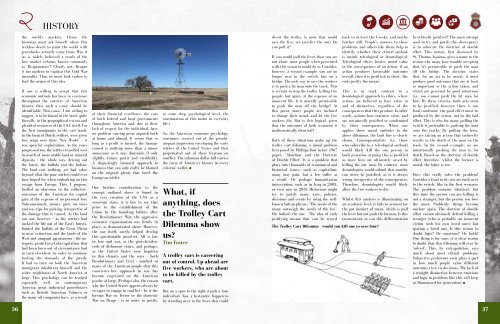The Future of Britain
Create successful ePaper yourself
Turn your PDF publications into a flip-book with our unique Google optimized e-Paper software.
HISTORY<br />
the world’s markets. Hence the<br />
historian must ask himself where this<br />
reckless desire to paint the world with<br />
greenbacks actually came from. Was it<br />
(as is widely believed) a result <strong>of</strong> the<br />
free market reforms known commonly<br />
as ‘Reaganomics’? Clearly not, Reagan<br />
is too modern to explain this Cold War<br />
mentality. Thus we must look earlier to<br />
find the origin <strong>of</strong> this idea.<br />
If one is willing to accept that this<br />
economic outlook has been in existence<br />
throughout the entirety <strong>of</strong> American<br />
history, then such a cause should be<br />
identifiable. This cause, I am willing to<br />
suggest, is to be found in the land; quite<br />
literally, in the geographical extent and<br />
plentiful resources <strong>of</strong> the USA itself. For<br />
the first immigrants to the vast lands,<br />
in the form <strong>of</strong> Dutch settlers, were given<br />
free reign over their ‘New World’ – it<br />
was open for exploitation. As the years<br />
progressed too, the settlers travelled west<br />
in search <strong>of</strong> more arable land or mineral<br />
deposits - the whole way, driving out<br />
the forest, the buffalo and the Indian.<br />
<strong>The</strong> land cost nothing, yet had value<br />
beyond what the poor settlers could ever<br />
have hoped for when embarking on this<br />
voyage from Europe. This, I propose,<br />
fuelled an obsession in the collectiveconscious<br />
<strong>of</strong> the Americas for capital<br />
gain at the expense <strong>of</strong> no personal loss.<br />
Subconsciously, money grew on trees<br />
and was ripe for picking, irrespective <strong>of</strong><br />
the damage that it caused. As the land<br />
ran out, however – as the settlers had<br />
sucked the life out <strong>of</strong> the East’s forests,<br />
hunted the buffalo <strong>of</strong> the Great Plains<br />
to near extinction and the lands <strong>of</strong> the<br />
West met rampant agrarianism – the noregrets,<br />
proto-Coca-Cola-capitalism that<br />
had been born out <strong>of</strong> circumstance had<br />
to turn elsewhere in order to continue<br />
feeding the demands <strong>of</strong> the greedy.<br />
It had to turn on both the American<br />
immigrant inhabitant himself and the<br />
wider neighbours <strong>of</strong> North America at<br />
large. This psychology can be tracked<br />
especially well in contemporary<br />
America; great industrial powerhouses<br />
such as British American Tobacco or<br />
the many oil companies have, as a result<br />
<strong>of</strong> their financial excellence, the ears<br />
<strong>of</strong> both federal and local governments<br />
throughout America and, due to their<br />
lack <strong>of</strong> respect for the individual, have<br />
no problem causing great anguish both<br />
at home and abroad. It seems that so<br />
long as a pr<strong>of</strong>it is turned, the damage<br />
caused is nothing more than a minor<br />
annoyance as it may diminish, if only<br />
slightly, future pr<strong>of</strong>it and credibility.<br />
A disgustingly immoral approach to<br />
business that can only really be blamed<br />
on the original plenty that faced the<br />
European settler.<br />
One further consideration to the<br />
concept outlined above is found in<br />
the very creation <strong>of</strong> the USA as a<br />
sovereign state; it is fair to say that<br />
prior to the establishment <strong>of</strong> the<br />
Union by the founding fathers after<br />
the Revolutionary War, the aggressive<br />
economic expansionism was firmly in<br />
place, as demonstrated above. However,<br />
the war itself, surely, helped develop<br />
this questionable mind-set. All is fair<br />
in love and war, so the post-chivalric<br />
code <strong>of</strong> dishonour states, and perhaps,<br />
as the United States were begotten<br />
in this climate and the wars – both<br />
Revolutionary and Civil – touched so<br />
many <strong>of</strong> the American people that this<br />
conscience-free approach to war has<br />
become engrained on the American<br />
psyche at large. (Perhaps also, the reason<br />
why the United States appears always be<br />
so eager to engage in conflict – be it the<br />
foreign War on Terror or the domestic<br />
War on Drugs – is in order to justify,<br />
at some deep psychological level, the<br />
continuation <strong>of</strong> this motto in everyday<br />
life.)<br />
So, the American economic psychology<br />
continues, created out <strong>of</strong> the pseudoutopian<br />
impression enveloping the early<br />
settlers <strong>of</strong> the United States and then<br />
perpetuated out <strong>of</strong> their fixation on<br />
conflict. <strong>The</strong> infamous dollar bill carries<br />
the curse <strong>of</strong> America’s history in every<br />
citizens’ wallet. ƒ<br />
What, if<br />
anything, does<br />
the Trolley Cart<br />
Dilemma show<br />
us?<br />
Tim Foster<br />
A trolley cart is careering<br />
out <strong>of</strong> control. Up ahead are<br />
five workers, who are about<br />
to be killed by the trolley<br />
cart.<br />
But on a spur to the right stands a lone<br />
individual. You, a bystander, happen to<br />
be standing next to the lever that could<br />
divert the trolley, (a move that would<br />
save the five, yet sacrifice the one). Do<br />
you pull it?<br />
If you would pull the lever, then you are<br />
not alone: most people when presented<br />
with this scenario would do so. Consider,<br />
however, a second example: you are no<br />
longer next to the switch, but on a<br />
bridge. <strong>The</strong> only way to save the workers<br />
is to push a fat man onto the track. This<br />
is certain to stop the trolley killing five<br />
people, but again, at the expense <strong>of</strong> an<br />
innocent life. Is it morally permissible<br />
to push the man <strong>of</strong>f the bridge? At<br />
this point, many people are inclined<br />
to change their mind, and let the five<br />
workers die. But is this logical, given<br />
that the outcomes <strong>of</strong> both scenarios is<br />
mathematically identical?<br />
Both <strong>of</strong> these situations make up the<br />
trolley cart dilemma, a moral problem<br />
first posed by Phillipa Foot in her 1967<br />
paper, ‘Abortion and the Doctrine<br />
<strong>of</strong> Double Effect’. It is a problem that<br />
plays into thousands <strong>of</strong> economical and<br />
historical issues, such as capitalism:<br />
many may gain, but a few suffer as<br />
a result. Or perhaps humanitarian<br />
intervention, such as in Iraq in 2003,<br />
or even now in 2014. Historians might<br />
try to justify many wars, policies,<br />
decisions and events by using the wellknown<br />
Vulcan phrase: ‘<strong>The</strong> needs <strong>of</strong> the<br />
many, outweigh the needs <strong>of</strong> the few’.<br />
Or, indeed, the one. <strong>The</strong> idea <strong>of</strong> ends<br />
justifying means that can be traced<br />
back to at least the Greeks, and maybe<br />
further still. People’s answers to these<br />
problems, and others like them, help to<br />
identify whether their ethical outlook<br />
is mainly teleological or deontological.<br />
Teleological ethics locates moral value<br />
in the consequences <strong>of</strong> an action: if an<br />
action produces favourable outcomes<br />
overall, then it is justified; in short, ‘the<br />
ends justify the means’.<br />
This is in stark contrast to a<br />
deontological approach to ethics, where<br />
actions are believed to have value in<br />
and <strong>of</strong> themselves, regardless <strong>of</strong> the<br />
consequences that they produce. In other<br />
words, actions have intrinsic value, and<br />
are not morally justified or condemned<br />
by their consequences. When one<br />
applies these moral outlooks to the<br />
above dilemmas, the fault line is clearly<br />
shown. Consequentialists (i.e. those<br />
who subscribe to a teleological outlook)<br />
would likely kill the one person in<br />
both scenarios, arguing this is justified<br />
as more lives are ultimately saved by<br />
killing the one man. By contrast, most<br />
deontologists would submit that murder<br />
can never be justified, as it is always<br />
wrong irrespective <strong>of</strong> the consequences.<br />
<strong>The</strong>refore, deontologists would likely<br />
allow the five workers to die.<br />
Whilst this analysis is illuminating on<br />
an academic level, it fails to account for<br />
the gut instinct <strong>of</strong> many, which is pull<br />
the lever but not push the fat man. Is this<br />
inconsistent, or can this differentiation<br />
<strong>The</strong> Trolley Cart Dilemma - would you kill one to save four?<br />
be ethically justified? <strong>The</strong> main attempt<br />
used to try and justify this discrepancy<br />
is to advocate the doctrine <strong>of</strong> double<br />
effect. This notion, first discussed by<br />
St. Thomas Aquinas, gives a name to the<br />
reason why many have trouble accepting<br />
that it’s permissible to push the man<br />
<strong>of</strong>f the bridge. <strong>The</strong> doctrine states<br />
that, for an act to be moral, it must<br />
produce good outcomes that are at least<br />
as important as the action taken, and<br />
which are governed by good intentions<br />
(i.e. you cannot push the fat man for<br />
fun). By these criteria, both acts seem<br />
to be justified, however, there is one<br />
final condition: the good effect must be<br />
produced by the action, not by the bad<br />
effect. This is why, for many, pulling the<br />
switch is preferable to pushing the man<br />
onto the tracks. By pulling the lever,<br />
we are taking an action that indirectly<br />
results in the death <strong>of</strong> the man on the<br />
track. In the second example, we are<br />
intentionally pushing the man to his<br />
death. Based on the doctrine <strong>of</strong> double<br />
effect therefore, whilst the former is<br />
moral, the latter is not.<br />
Does this really solve the problem?<br />
Consider a final twist: you are back next<br />
to the switch, like in the first scenario.<br />
<strong>The</strong> problem remains identical, but<br />
this time the person you are killing is<br />
not a stranger, but the person you love<br />
the most. Suddenly, things become<br />
unclear again. <strong>The</strong> doctrine <strong>of</strong> double<br />
effect cannot obviously defend killing a<br />
stranger (who is probably an innocent<br />
victim with his own loved ones) but<br />
sparing a loved one. Is this reason to<br />
doubt logic? Or emotions? Or both?<br />
One thing is for sure: it is clear reason<br />
to doubt that this dilemma will ever be<br />
‘solved’. This, by extrapolation, says<br />
much about most ethical problems.<br />
Subjective preference even plays a part<br />
in how much people value different<br />
outcomes vis-a-vis decisions. <strong>The</strong> lack <strong>of</strong><br />
a straight distinction between emotions<br />
and logic in problems like this will keep<br />
us flummoxed for generations ƒ<br />
36<br />
37




